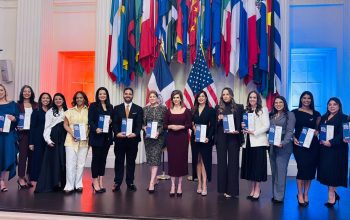news
GFDD Attends Debate on the Outcome of the Paris Climate Conference with New York Times Environment Correspondent
January 19, 2016
The Paris agreement made history as the universal climate change agreement, binding every country on earth to take action to reduce their carbon emissions. Unfortunately, the action pledged so far by countries will only cut emissions by about half as much as required to avoid the worst impacts of global warming. GFDD/Funglode attended a briefing session held at the Institute of International Education on Friday with Coral Davenport, the energy and environment correspondent
for the New York Times, to assess the outcomes of the Paris agreement and its significance for the fate of the planet.
Davenport commented on several points including the structure of the agreement, the role that developed states need to play, the winners and losers of the negotiations, and the financing requirements that need to be met to achieve the objectives set out in the agreement.
She explained that the agreement was a hybrid of sorts, with some
elements of the agreement being legally binding and others not. She informed the audience that had it been fully binding then most countries including the US would not have ratified it.

What is binding: elements to do with process (5-year commitment periods), transparency (all countries have to put their plans online and use the same metrics).
What is not binding: the substance (how you choose to implement the agreement).
Davenport called for the main polluting countries to follow the process laid out in the agreement explaining that they will create a political peer pressure environment whereby everyone else will follow suit. She warns that if the main polluters do not follow the process and respect the spirit of the document then it will be seen as a “paper tiger”, with only real
force on in theory.
Turning to the winners & losers of the negotiations, Davenport highlighted the coal industry as being the biggest loser. She pointed to the recent announcement of a US moratorium on new coal leases. She explained that the outcome could be to increase the price that the companies pay to mine on public land. The result of this slowdown is that coal industry employment is at the lowest it has been in 25 yrs.
She underscored the
importance of the business industry in helping governments meet the climate policy objectives set out in the agreement, including a global zero emissions goal that is to be achieved by 2050. With our current technology we are not able to get there. She stressed this means we will need a breakthrough in renewables technology to get through to zero emissions. This translates to an investment in new technology of nearly $300 billion on a yearly basis!
Finally, Davenport
noted that finance was the biggest issue at the negotiations. The Green Climate Fund, one of the main climate finance instrument still only has $12BN in it (he aim is to reach $100 BN). She noted an ongoing issue to keep track of all the finance without the presence of an actual institution counting the money (particularly with pure adaptation projects that have no return for investors).
Related Links:
https://selectra.co.uk/energy/guides/environment/cop21






